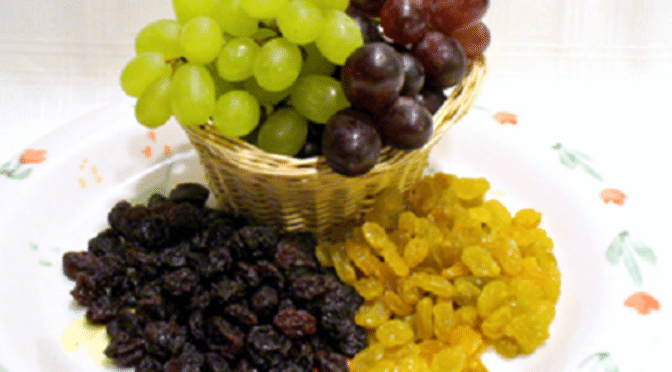Blog
Dangers of Sultanas, Raisins and Grapes for Dogs
By: BVECCS Admin
On: April 26, 2018

Grapes and Dogs
While most animal owners are aware that chocolate is toxic to dogs, not many are aware of the possible dangers of grapes, raisins, sultanas and currants (which sometimes can be dried black grapes). This lack of awareness, plus the fact that grapes are healthy for us humans, mean that some pet owners unknowingly provide this ‘healthy treat’ to their pets. This may be life-threatening to dogs causing acute kidney failure. Not only is there a potential danger in the deliberate feeding of these fruits to dogs but there is a high chance of accidental exposure to this potential toxin.
There is also some anecdotal evidence that cats may also be at risk although birds seem perfectly safe.
Are Grapes Toxic to Dogs?
Not all dogs have the same susceptibility.
Some dogs are more susceptible than others to the toxicity from sultana, grape and raisin exposure. At the current time, there is a great deal of controversy within the veterinary field as to what the specific toxin is that makes them so dangerous to dogs. Evidence at this stage, suggests the toxin is within the flesh of the grape and water soluble. As to how it causes the damage it does or why some dogs are more susceptible to toxicity of these fruits, we don’t yet know. There is also no hard evidence as to how small the amount needs to be ingested to make your dog ill, nor unfortunately is there a test available to tell if your dog has that greater susceptibility to the toxic effects.
Best to Be Cautious
Grapes have been attributed to causing kidney failure and even death in dogs. While there is a great deal of controversy over the magnitude of the problem we believe it is best to be cautious.
Signs that your dog may have been poisoned include vomiting, lethargy and diarrhoea. There also may be reduced appetite and more or less urination.
If your dog is exhibiting these symptoms, it is best to give your vet a call, whether your pet has or hasn’t eaten grapes or raisins. These symptoms may be a sign of grape toxicity or many other different types of toxicities or illnesses.
If your dog has consumed any quantity of grapes, sultanas, raisins or currants, you should contact your vet straight away. Your vet (or emergency vet if it is after hours) will probably advise you to bring your dog to the clinic immediately if your pet has ingested even a small amount or if your dog is showing symptoms of poisoning.
Treatment for Grape Toxicity/Exposure
At BVECCS after hours emergency vet in Albany Creek if your dog has consumed or suspected to have consumed even a small amount of sultanas, grapes, currants or raisins we will recommend that you bring in your pet to be seen immediately and examined.
Our first step would be to administer an emetic to induce vomiting to remove as much as possible from the stomach. Once this process is complete the next step is to give your dog activated charcoal which helps to absorb any remaining toxins in your dog’s gastrointestinal tract.
Intravenous fluid therapy will also be done dependent on the exposure, usually for around 48-72 hours to support the kidneys with monitoring of kidney values.
Prognosis with early decontamination and support is quite good. Once kidney failure develops, the outlook is greatly decreased.
BVECCS
At BVECCS Veterinary Emergency Service you can be assured that your pet will be in the most capable and experienced hands. We will also talk to you about the treatment options and answer your questions so you can consider what is best for you and your pet.
Prevent Consumption of These Foods
Obviously, the best solution is simply not to allow your dog (or cat) to consume sultanas, grapes, raisins and currants. “This sounds easy enough”, you say. But you need to be aware that these fruits are in other common foods such as breakfast cereal, baked goods such as cakes and bread, muesli bars and cookies etc.
If you have school-aged children in your home, you need to inform them of the potential danger of these foods as accidental exposure can occur through leaving school lunches in open school bags or leaving a plate of cereal on a low table or the floor for example.
Also, raisins and grapes are a common snack for toddlers, and this can make accidental exposure a high risk. Toddlers often like to share their food with their pets and also often drop food on the floor or leave food lying around. Thus when providing one of these treats or products with these ingredients, it is best to be highly vigilant and remove the dog from the room while your toddler enjoys his or her food, perfectly healthy for them, but possibly life-threatening for their pet dog.
It is also important to ensure that your dog cannot access your garbage bin so he or she can’t go scavenging and ingest these or other toxic foods.
It is also recommended that any products with these ingredients be stored on the higher shelves in your pantry, high enough that your fur-babies cannot reach them.








